Four Seasons Hotel London: Managing Accommodation Services Report
VerifiedAdded on 2020/12/18
|16
|4617
|312
Report
AI Summary
This report delves into the management of accommodation services, using the Four Seasons Hotel London as a case study. It begins by outlining the scale and size of the accommodation sector within the hospitality industry, followed by a discussion of different ownership models. The report then explores the role of grading, classification systems, and online review sites in shaping customer perceptions and choices. The organization and functions of the front office department are examined, with a focus on key roles and responsibilities. The report also reviews the key roles within the housekeeping department and the importance of forecasting linen and guest supplies. Furthermore, the importance of interdepartmental relationships, scheduling maintenance, and security measures are discussed. The report provides a comprehensive overview of the operational aspects of managing accommodation services, emphasizing the importance of customer satisfaction and efficient operations.
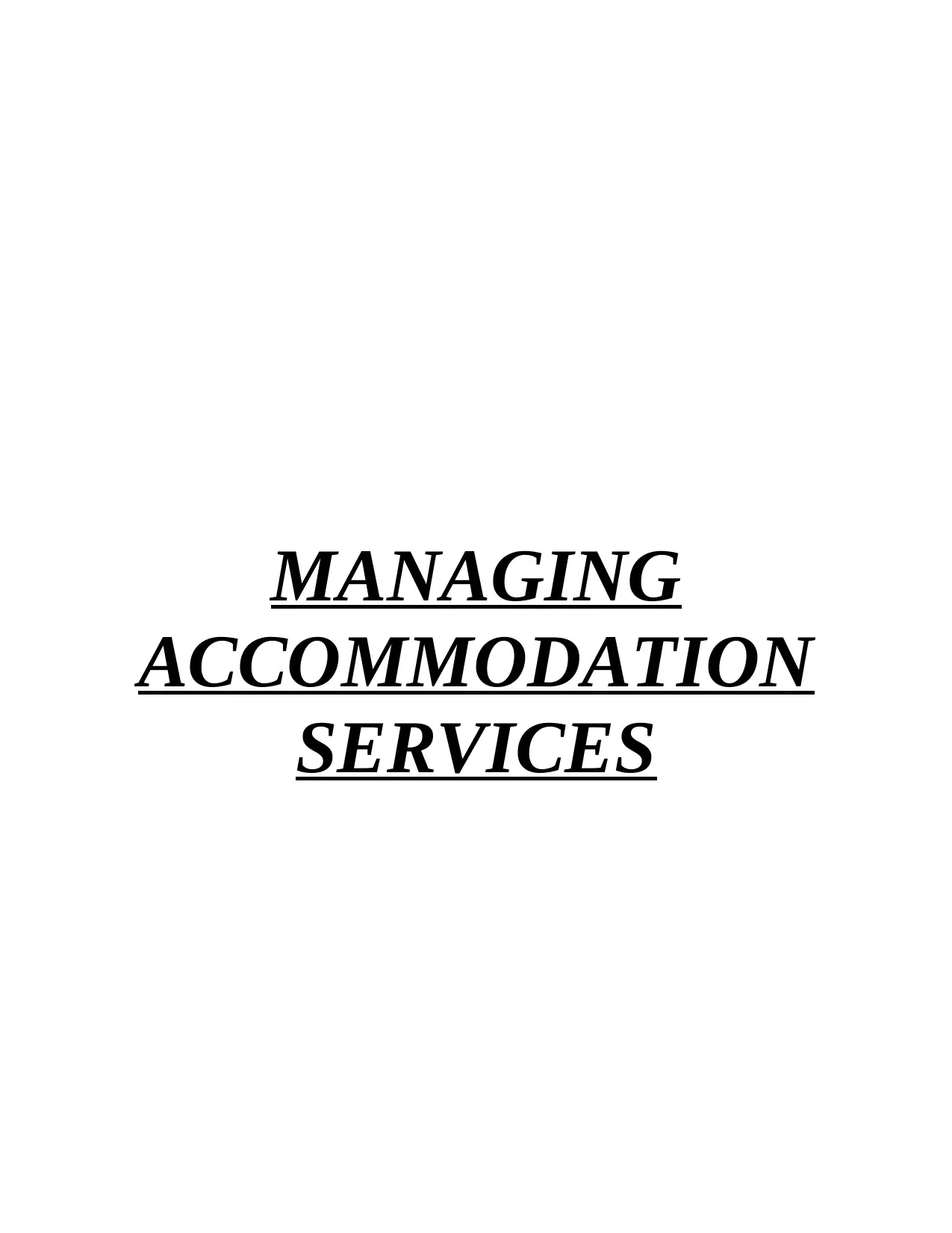
MANAGING
ACCOMMODATION
SERVICES
ACCOMMODATION
SERVICES
Paraphrase This Document
Need a fresh take? Get an instant paraphrase of this document with our AI Paraphraser
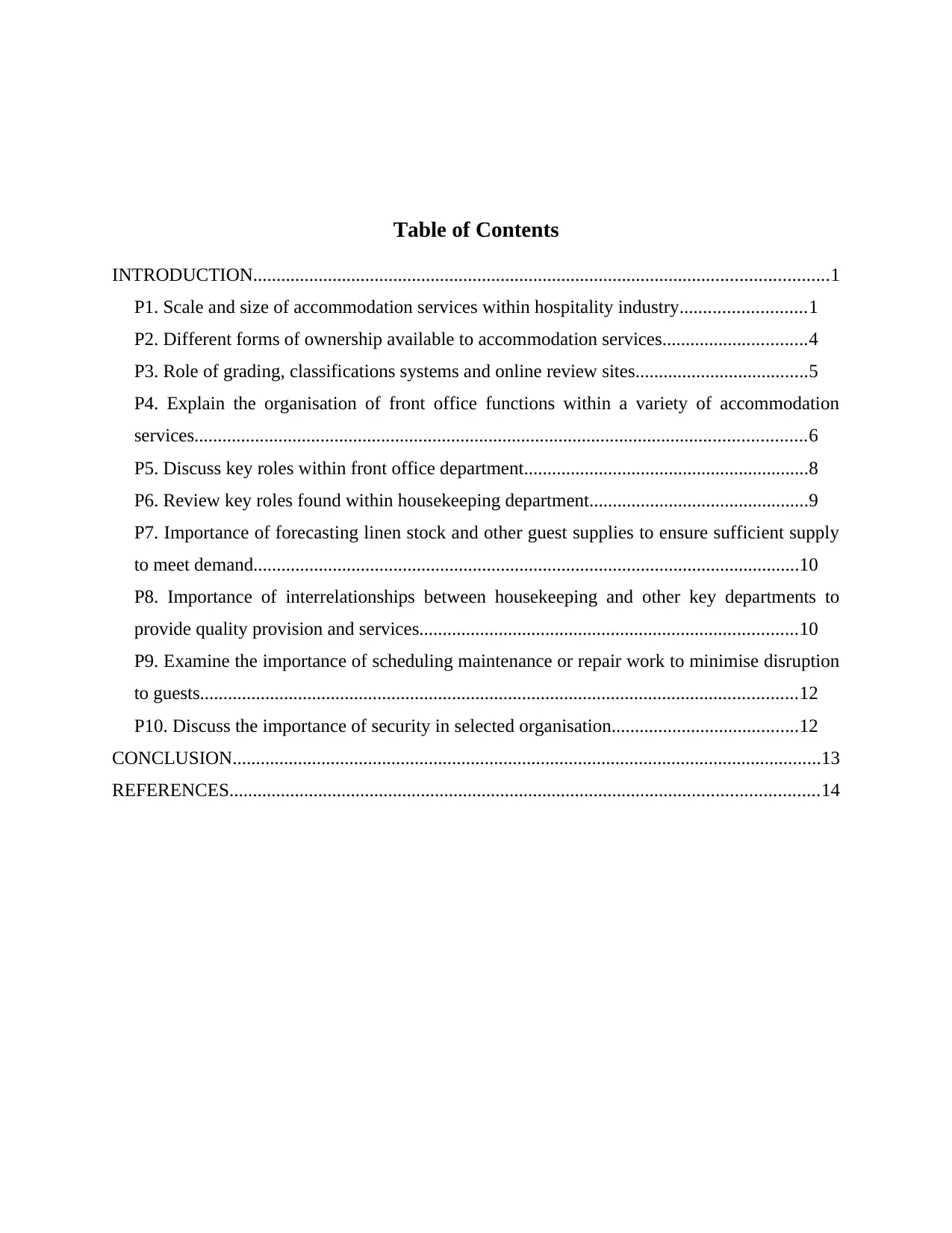
Table of Contents
INTRODUCTION...........................................................................................................................1
P1. Scale and size of accommodation services within hospitality industry...........................1
P2. Different forms of ownership available to accommodation services...............................4
P3. Role of grading, classifications systems and online review sites.....................................5
P4. Explain the organisation of front office functions within a variety of accommodation
services...................................................................................................................................6
P5. Discuss key roles within front office department.............................................................8
P6. Review key roles found within housekeeping department...............................................9
P7. Importance of forecasting linen stock and other guest supplies to ensure sufficient supply
to meet demand.....................................................................................................................10
P8. Importance of interrelationships between housekeeping and other key departments to
provide quality provision and services.................................................................................10
P9. Examine the importance of scheduling maintenance or repair work to minimise disruption
to guests................................................................................................................................12
P10. Discuss the importance of security in selected organisation........................................12
CONCLUSION..............................................................................................................................13
REFERENCES..............................................................................................................................14
INTRODUCTION...........................................................................................................................1
P1. Scale and size of accommodation services within hospitality industry...........................1
P2. Different forms of ownership available to accommodation services...............................4
P3. Role of grading, classifications systems and online review sites.....................................5
P4. Explain the organisation of front office functions within a variety of accommodation
services...................................................................................................................................6
P5. Discuss key roles within front office department.............................................................8
P6. Review key roles found within housekeeping department...............................................9
P7. Importance of forecasting linen stock and other guest supplies to ensure sufficient supply
to meet demand.....................................................................................................................10
P8. Importance of interrelationships between housekeeping and other key departments to
provide quality provision and services.................................................................................10
P9. Examine the importance of scheduling maintenance or repair work to minimise disruption
to guests................................................................................................................................12
P10. Discuss the importance of security in selected organisation........................................12
CONCLUSION..............................................................................................................................13
REFERENCES..............................................................................................................................14
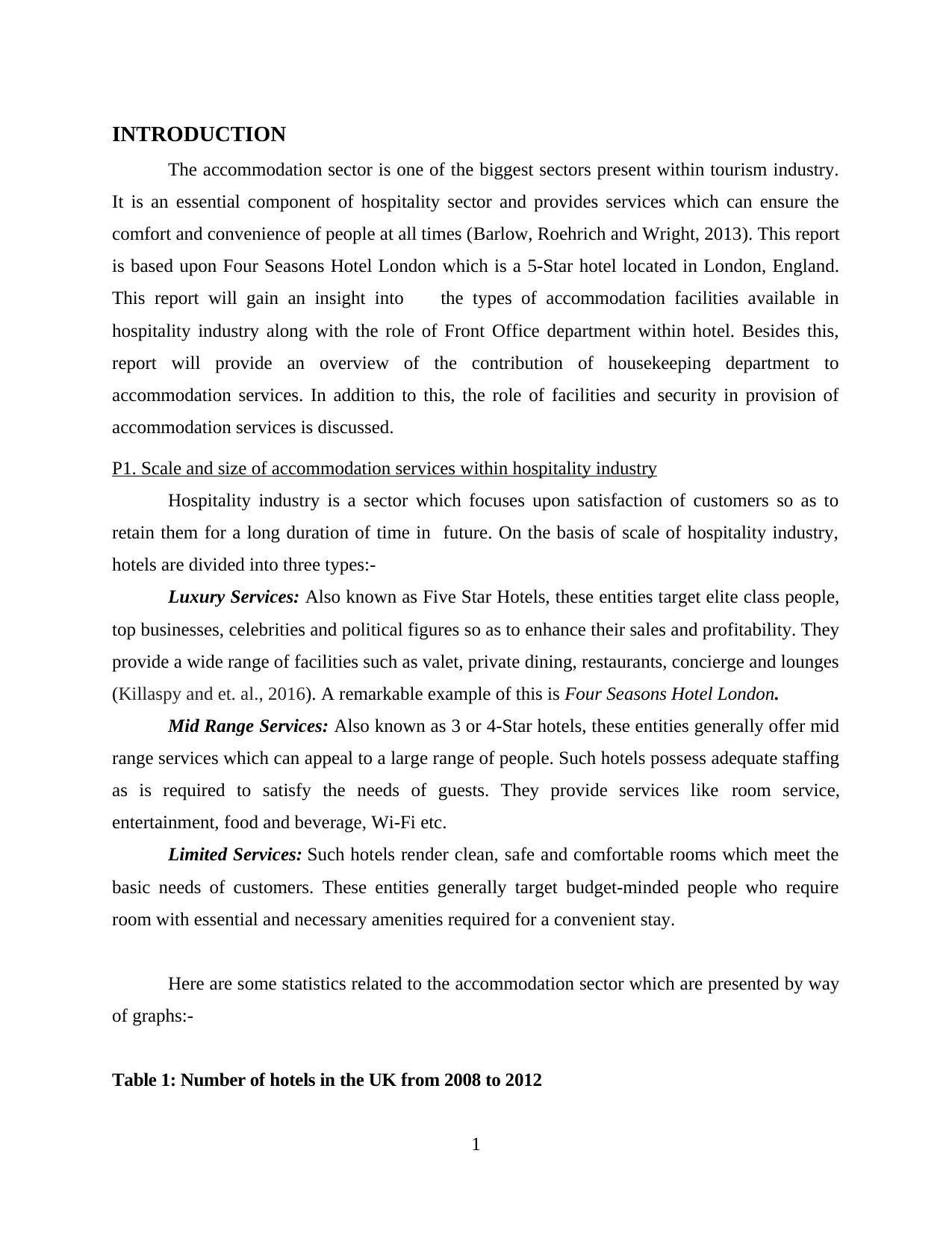
INTRODUCTION
The accommodation sector is one of the biggest sectors present within tourism industry.
It is an essential component of hospitality sector and provides services which can ensure the
comfort and convenience of people at all times (Barlow, Roehrich and Wright, 2013). This report
is based upon Four Seasons Hotel London which is a 5-Star hotel located in London, England.
This report will gain an insight into the types of accommodation facilities available in
hospitality industry along with the role of Front Office department within hotel. Besides this,
report will provide an overview of the contribution of housekeeping department to
accommodation services. In addition to this, the role of facilities and security in provision of
accommodation services is discussed.
P1. Scale and size of accommodation services within hospitality industry
Hospitality industry is a sector which focuses upon satisfaction of customers so as to
retain them for a long duration of time in future. On the basis of scale of hospitality industry,
hotels are divided into three types:-
Luxury Services: Also known as Five Star Hotels, these entities target elite class people,
top businesses, celebrities and political figures so as to enhance their sales and profitability. They
provide a wide range of facilities such as valet, private dining, restaurants, concierge and lounges
(Killaspy and et. al., 2016). A remarkable example of this is Four Seasons Hotel London.
Mid Range Services: Also known as 3 or 4-Star hotels, these entities generally offer mid
range services which can appeal to a large range of people. Such hotels possess adequate staffing
as is required to satisfy the needs of guests. They provide services like room service,
entertainment, food and beverage, Wi-Fi etc.
Limited Services: Such hotels render clean, safe and comfortable rooms which meet the
basic needs of customers. These entities generally target budget-minded people who require
room with essential and necessary amenities required for a convenient stay.
Here are some statistics related to the accommodation sector which are presented by way
of graphs:-
Table 1: Number of hotels in the UK from 2008 to 2012
1
The accommodation sector is one of the biggest sectors present within tourism industry.
It is an essential component of hospitality sector and provides services which can ensure the
comfort and convenience of people at all times (Barlow, Roehrich and Wright, 2013). This report
is based upon Four Seasons Hotel London which is a 5-Star hotel located in London, England.
This report will gain an insight into the types of accommodation facilities available in
hospitality industry along with the role of Front Office department within hotel. Besides this,
report will provide an overview of the contribution of housekeeping department to
accommodation services. In addition to this, the role of facilities and security in provision of
accommodation services is discussed.
P1. Scale and size of accommodation services within hospitality industry
Hospitality industry is a sector which focuses upon satisfaction of customers so as to
retain them for a long duration of time in future. On the basis of scale of hospitality industry,
hotels are divided into three types:-
Luxury Services: Also known as Five Star Hotels, these entities target elite class people,
top businesses, celebrities and political figures so as to enhance their sales and profitability. They
provide a wide range of facilities such as valet, private dining, restaurants, concierge and lounges
(Killaspy and et. al., 2016). A remarkable example of this is Four Seasons Hotel London.
Mid Range Services: Also known as 3 or 4-Star hotels, these entities generally offer mid
range services which can appeal to a large range of people. Such hotels possess adequate staffing
as is required to satisfy the needs of guests. They provide services like room service,
entertainment, food and beverage, Wi-Fi etc.
Limited Services: Such hotels render clean, safe and comfortable rooms which meet the
basic needs of customers. These entities generally target budget-minded people who require
room with essential and necessary amenities required for a convenient stay.
Here are some statistics related to the accommodation sector which are presented by way
of graphs:-
Table 1: Number of hotels in the UK from 2008 to 2012
1
⊘ This is a preview!⊘
Do you want full access?
Subscribe today to unlock all pages.

Trusted by 1+ million students worldwide
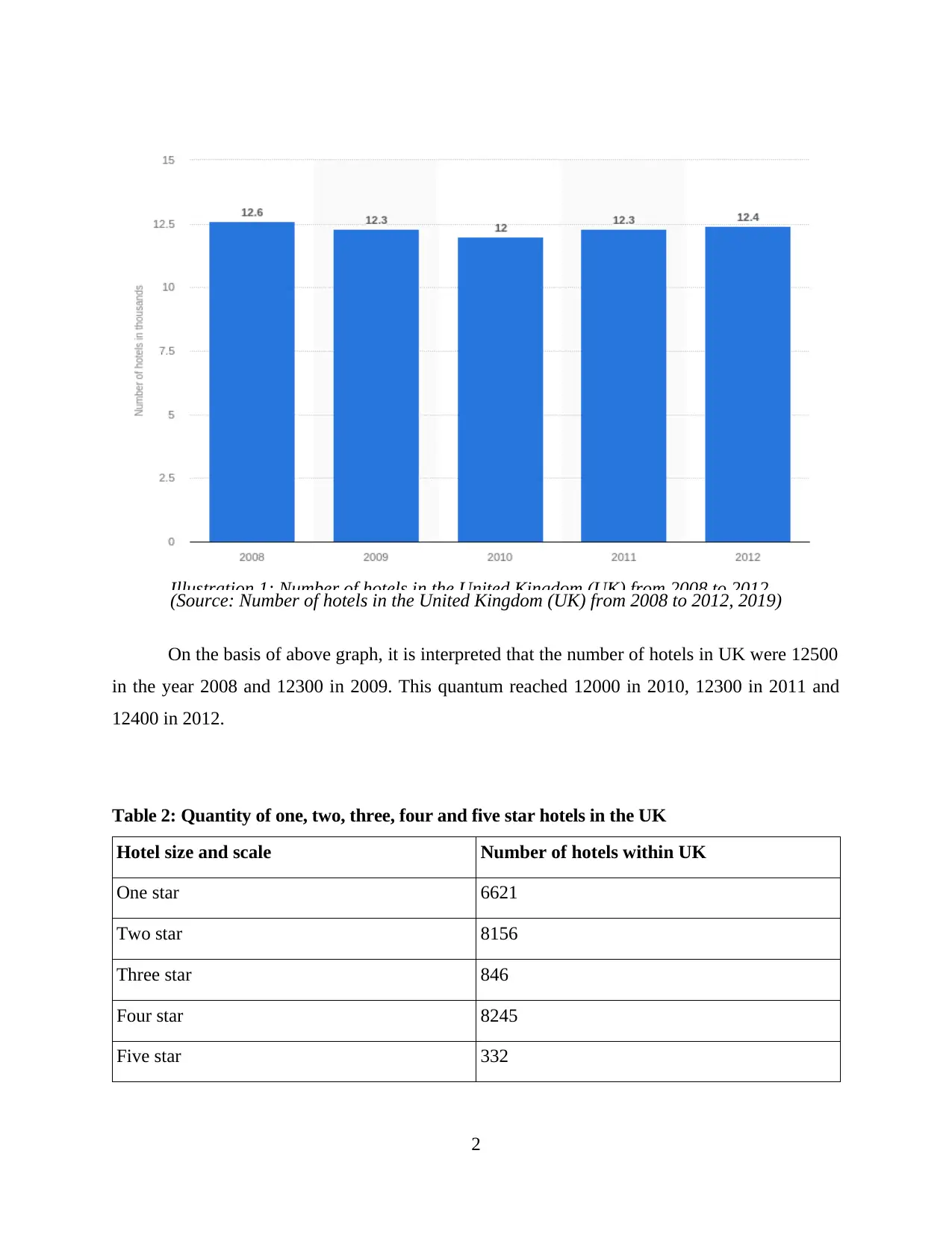
(Source: Number of hotels in the United Kingdom (UK) from 2008 to 2012, 2019)
On the basis of above graph, it is interpreted that the number of hotels in UK were 12500
in the year 2008 and 12300 in 2009. This quantum reached 12000 in 2010, 12300 in 2011 and
12400 in 2012.
Table 2: Quantity of one, two, three, four and five star hotels in the UK
Hotel size and scale Number of hotels within UK
One star 6621
Two star 8156
Three star 846
Four star 8245
Five star 332
2
Illustration 1: Number of hotels in the United Kingdom (UK) from 2008 to 2012
On the basis of above graph, it is interpreted that the number of hotels in UK were 12500
in the year 2008 and 12300 in 2009. This quantum reached 12000 in 2010, 12300 in 2011 and
12400 in 2012.
Table 2: Quantity of one, two, three, four and five star hotels in the UK
Hotel size and scale Number of hotels within UK
One star 6621
Two star 8156
Three star 846
Four star 8245
Five star 332
2
Illustration 1: Number of hotels in the United Kingdom (UK) from 2008 to 2012
Paraphrase This Document
Need a fresh take? Get an instant paraphrase of this document with our AI Paraphraser
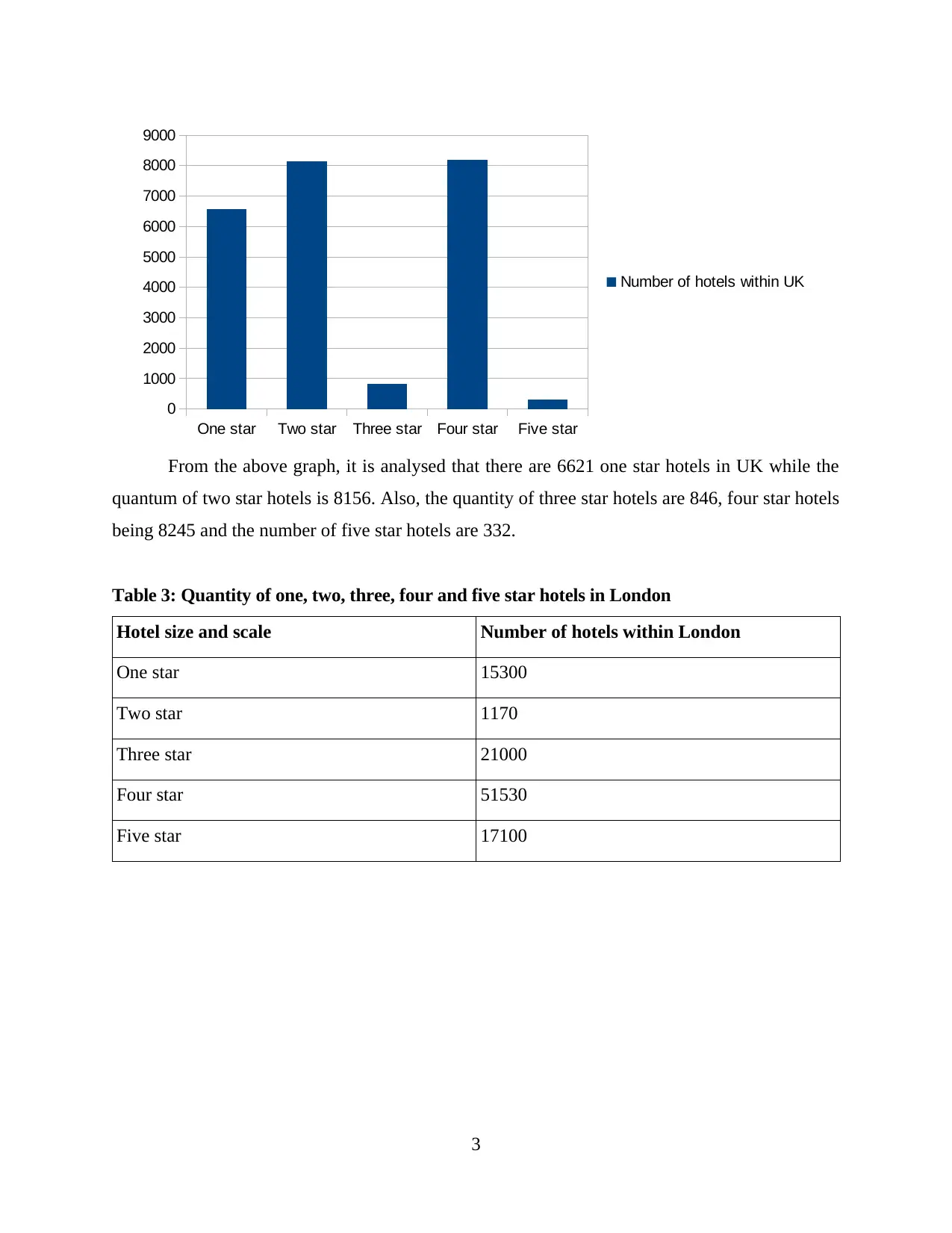
From the above graph, it is analysed that there are 6621 one star hotels in UK while the
quantum of two star hotels is 8156. Also, the quantity of three star hotels are 846, four star hotels
being 8245 and the number of five star hotels are 332.
Table 3: Quantity of one, two, three, four and five star hotels in London
Hotel size and scale Number of hotels within London
One star 15300
Two star 1170
Three star 21000
Four star 51530
Five star 17100
3
One star Two star Three star Four star Five star
0
1000
2000
3000
4000
5000
6000
7000
8000
9000
Number of hotels within UK
quantum of two star hotels is 8156. Also, the quantity of three star hotels are 846, four star hotels
being 8245 and the number of five star hotels are 332.
Table 3: Quantity of one, two, three, four and five star hotels in London
Hotel size and scale Number of hotels within London
One star 15300
Two star 1170
Three star 21000
Four star 51530
Five star 17100
3
One star Two star Three star Four star Five star
0
1000
2000
3000
4000
5000
6000
7000
8000
9000
Number of hotels within UK
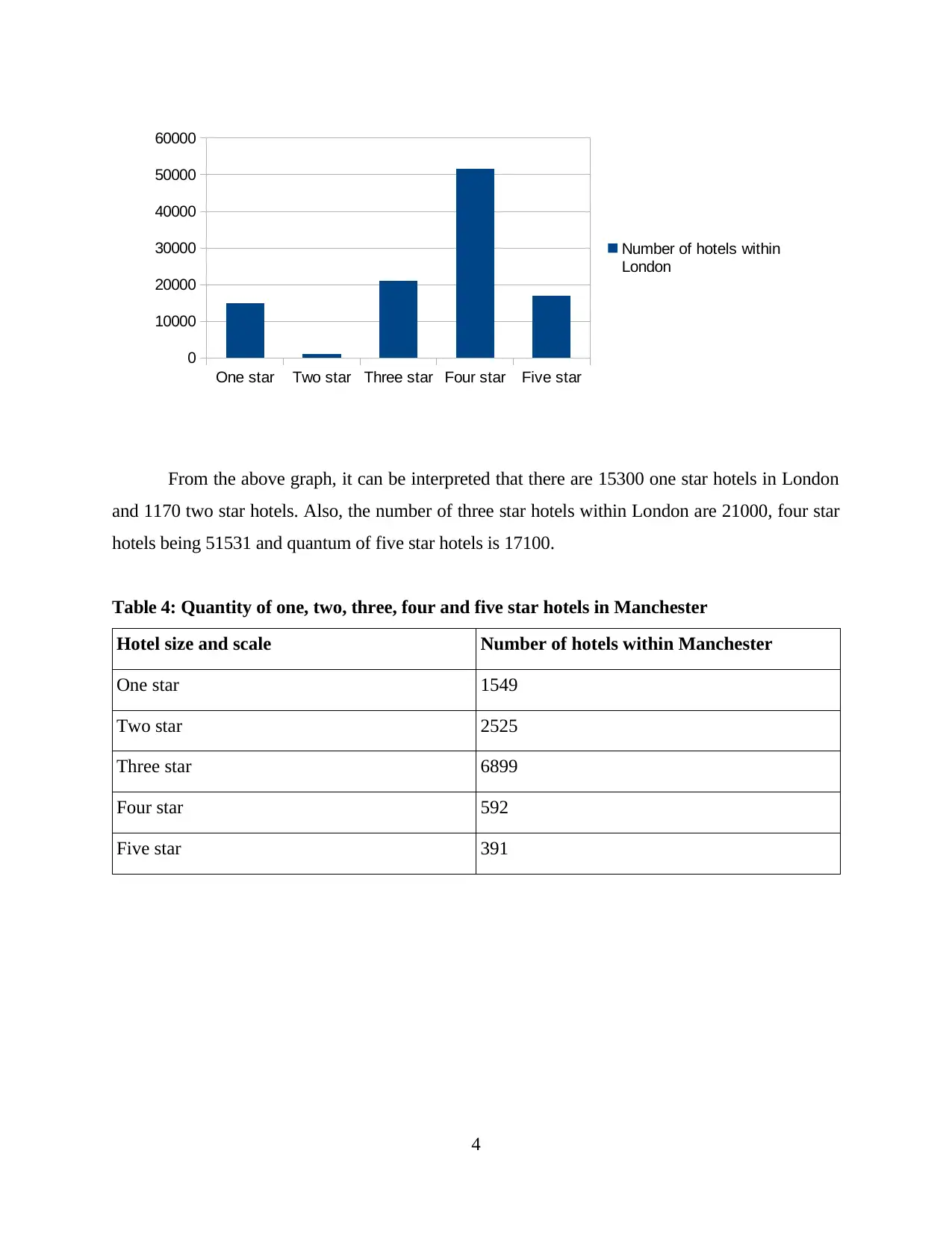
From the above graph, it can be interpreted that there are 15300 one star hotels in London
and 1170 two star hotels. Also, the number of three star hotels within London are 21000, four star
hotels being 51531 and quantum of five star hotels is 17100.
Table 4: Quantity of one, two, three, four and five star hotels in Manchester
Hotel size and scale Number of hotels within Manchester
One star 1549
Two star 2525
Three star 6899
Four star 592
Five star 391
4
One star Two star Three star Four star Five star
0
10000
20000
30000
40000
50000
60000
Number of hotels within
London
and 1170 two star hotels. Also, the number of three star hotels within London are 21000, four star
hotels being 51531 and quantum of five star hotels is 17100.
Table 4: Quantity of one, two, three, four and five star hotels in Manchester
Hotel size and scale Number of hotels within Manchester
One star 1549
Two star 2525
Three star 6899
Four star 592
Five star 391
4
One star Two star Three star Four star Five star
0
10000
20000
30000
40000
50000
60000
Number of hotels within
London
⊘ This is a preview!⊘
Do you want full access?
Subscribe today to unlock all pages.

Trusted by 1+ million students worldwide
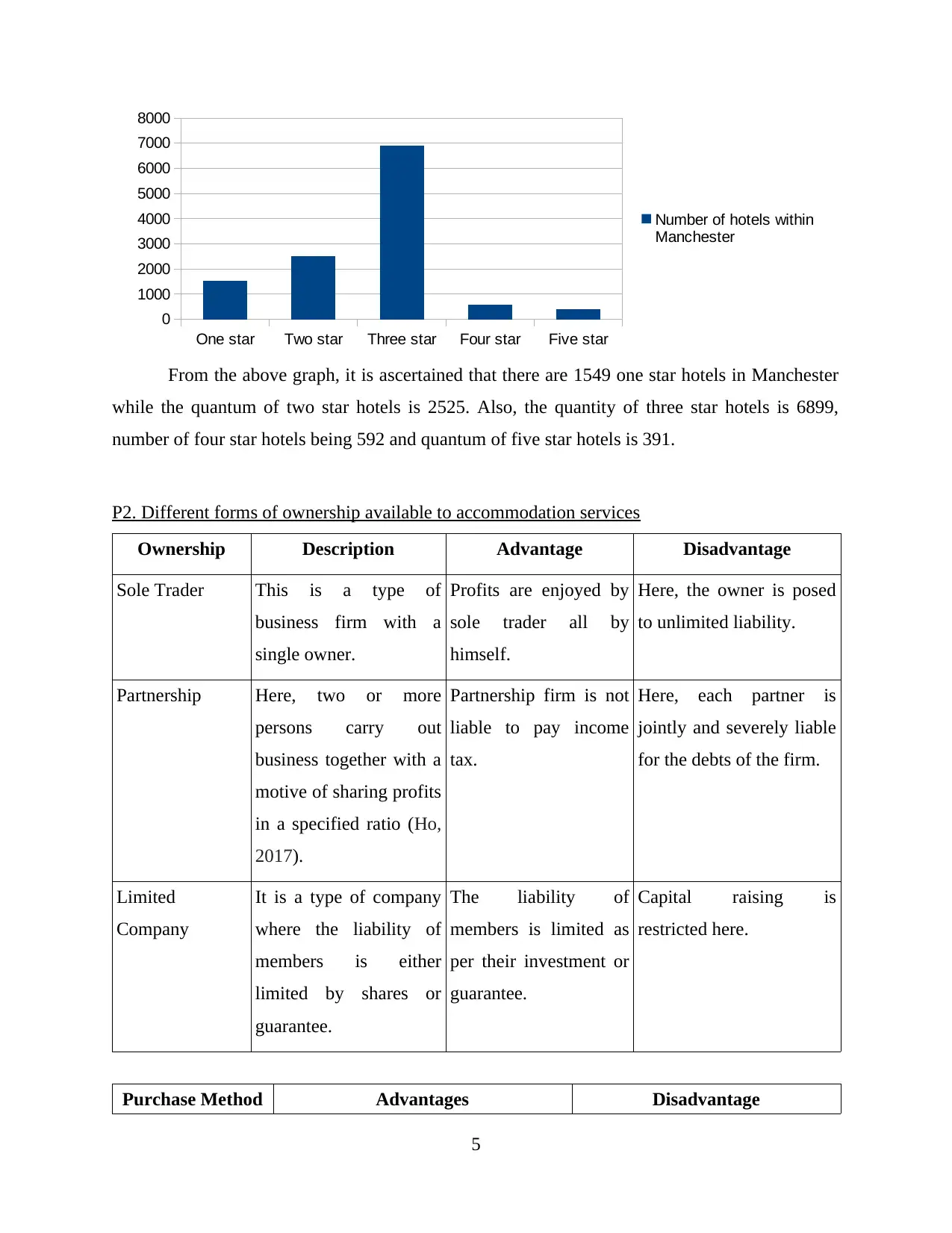
From the above graph, it is ascertained that there are 1549 one star hotels in Manchester
while the quantum of two star hotels is 2525. Also, the quantity of three star hotels is 6899,
number of four star hotels being 592 and quantum of five star hotels is 391.
P2. Different forms of ownership available to accommodation services
Ownership Description Advantage Disadvantage
Sole Trader This is a type of
business firm with a
single owner.
Profits are enjoyed by
sole trader all by
himself.
Here, the owner is posed
to unlimited liability.
Partnership Here, two or more
persons carry out
business together with a
motive of sharing profits
in a specified ratio (Ho,
2017).
Partnership firm is not
liable to pay income
tax.
Here, each partner is
jointly and severely liable
for the debts of the firm.
Limited
Company
It is a type of company
where the liability of
members is either
limited by shares or
guarantee.
The liability of
members is limited as
per their investment or
guarantee.
Capital raising is
restricted here.
Purchase Method Advantages Disadvantage
5
One star Two star Three star Four star Five star
0
1000
2000
3000
4000
5000
6000
7000
8000
Number of hotels within
Manchester
while the quantum of two star hotels is 2525. Also, the quantity of three star hotels is 6899,
number of four star hotels being 592 and quantum of five star hotels is 391.
P2. Different forms of ownership available to accommodation services
Ownership Description Advantage Disadvantage
Sole Trader This is a type of
business firm with a
single owner.
Profits are enjoyed by
sole trader all by
himself.
Here, the owner is posed
to unlimited liability.
Partnership Here, two or more
persons carry out
business together with a
motive of sharing profits
in a specified ratio (Ho,
2017).
Partnership firm is not
liable to pay income
tax.
Here, each partner is
jointly and severely liable
for the debts of the firm.
Limited
Company
It is a type of company
where the liability of
members is either
limited by shares or
guarantee.
The liability of
members is limited as
per their investment or
guarantee.
Capital raising is
restricted here.
Purchase Method Advantages Disadvantage
5
One star Two star Three star Four star Five star
0
1000
2000
3000
4000
5000
6000
7000
8000
Number of hotels within
Manchester
Paraphrase This Document
Need a fresh take? Get an instant paraphrase of this document with our AI Paraphraser
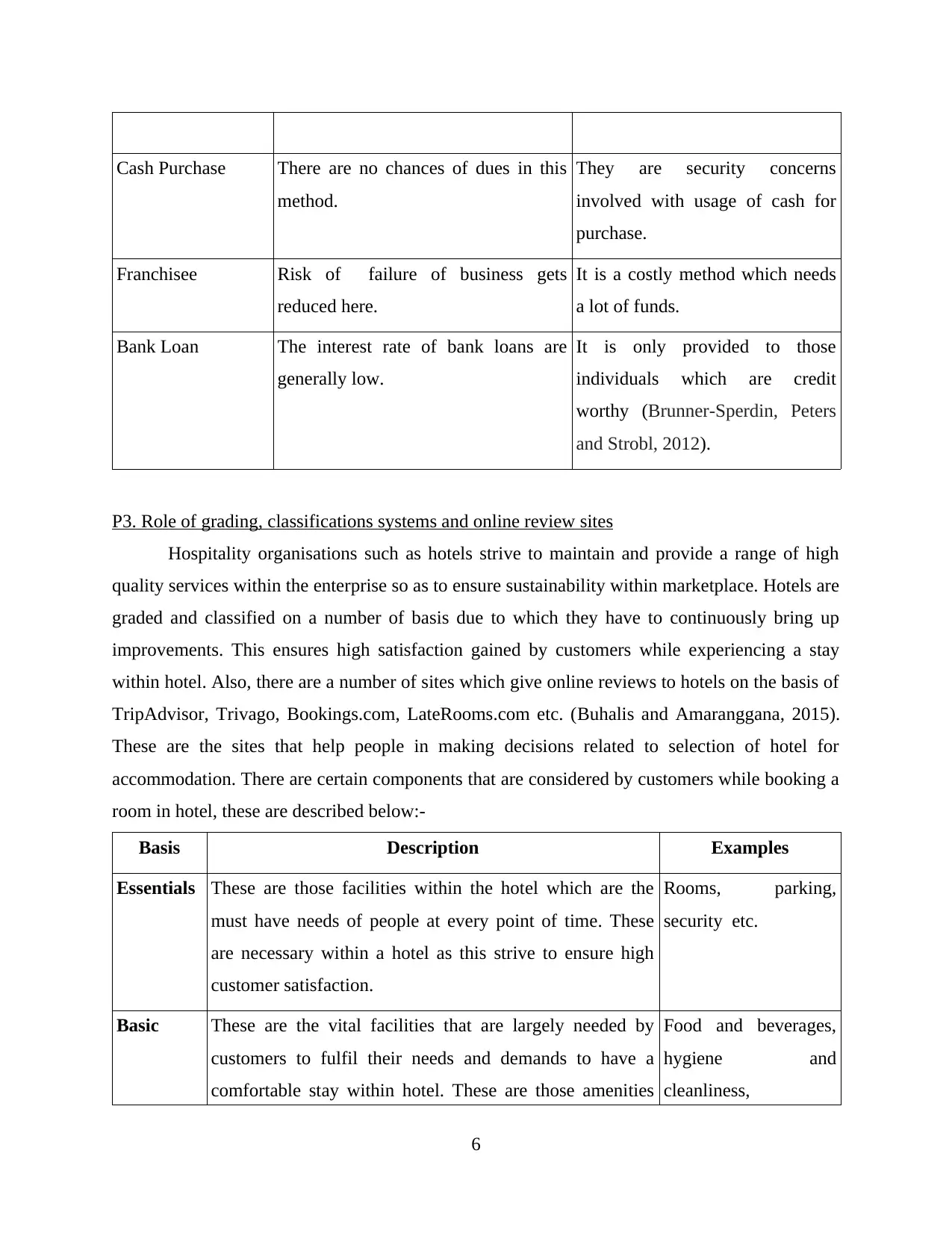
Cash Purchase There are no chances of dues in this
method.
They are security concerns
involved with usage of cash for
purchase.
Franchisee Risk of failure of business gets
reduced here.
It is a costly method which needs
a lot of funds.
Bank Loan The interest rate of bank loans are
generally low.
It is only provided to those
individuals which are credit
worthy (Brunner-Sperdin, Peters
and Strobl, 2012).
P3. Role of grading, classifications systems and online review sites
Hospitality organisations such as hotels strive to maintain and provide a range of high
quality services within the enterprise so as to ensure sustainability within marketplace. Hotels are
graded and classified on a number of basis due to which they have to continuously bring up
improvements. This ensures high satisfaction gained by customers while experiencing a stay
within hotel. Also, there are a number of sites which give online reviews to hotels on the basis of
TripAdvisor, Trivago, Bookings.com, LateRooms.com etc. (Buhalis and Amaranggana, 2015).
These are the sites that help people in making decisions related to selection of hotel for
accommodation. There are certain components that are considered by customers while booking a
room in hotel, these are described below:-
Basis Description Examples
Essentials These are those facilities within the hotel which are the
must have needs of people at every point of time. These
are necessary within a hotel as this strive to ensure high
customer satisfaction.
Rooms, parking,
security etc.
Basic These are the vital facilities that are largely needed by
customers to fulfil their needs and demands to have a
comfortable stay within hotel. These are those amenities
Food and beverages,
hygiene and
cleanliness,
6
method.
They are security concerns
involved with usage of cash for
purchase.
Franchisee Risk of failure of business gets
reduced here.
It is a costly method which needs
a lot of funds.
Bank Loan The interest rate of bank loans are
generally low.
It is only provided to those
individuals which are credit
worthy (Brunner-Sperdin, Peters
and Strobl, 2012).
P3. Role of grading, classifications systems and online review sites
Hospitality organisations such as hotels strive to maintain and provide a range of high
quality services within the enterprise so as to ensure sustainability within marketplace. Hotels are
graded and classified on a number of basis due to which they have to continuously bring up
improvements. This ensures high satisfaction gained by customers while experiencing a stay
within hotel. Also, there are a number of sites which give online reviews to hotels on the basis of
TripAdvisor, Trivago, Bookings.com, LateRooms.com etc. (Buhalis and Amaranggana, 2015).
These are the sites that help people in making decisions related to selection of hotel for
accommodation. There are certain components that are considered by customers while booking a
room in hotel, these are described below:-
Basis Description Examples
Essentials These are those facilities within the hotel which are the
must have needs of people at every point of time. These
are necessary within a hotel as this strive to ensure high
customer satisfaction.
Rooms, parking,
security etc.
Basic These are the vital facilities that are largely needed by
customers to fulfil their needs and demands to have a
comfortable stay within hotel. These are those amenities
Food and beverages,
hygiene and
cleanliness,
6
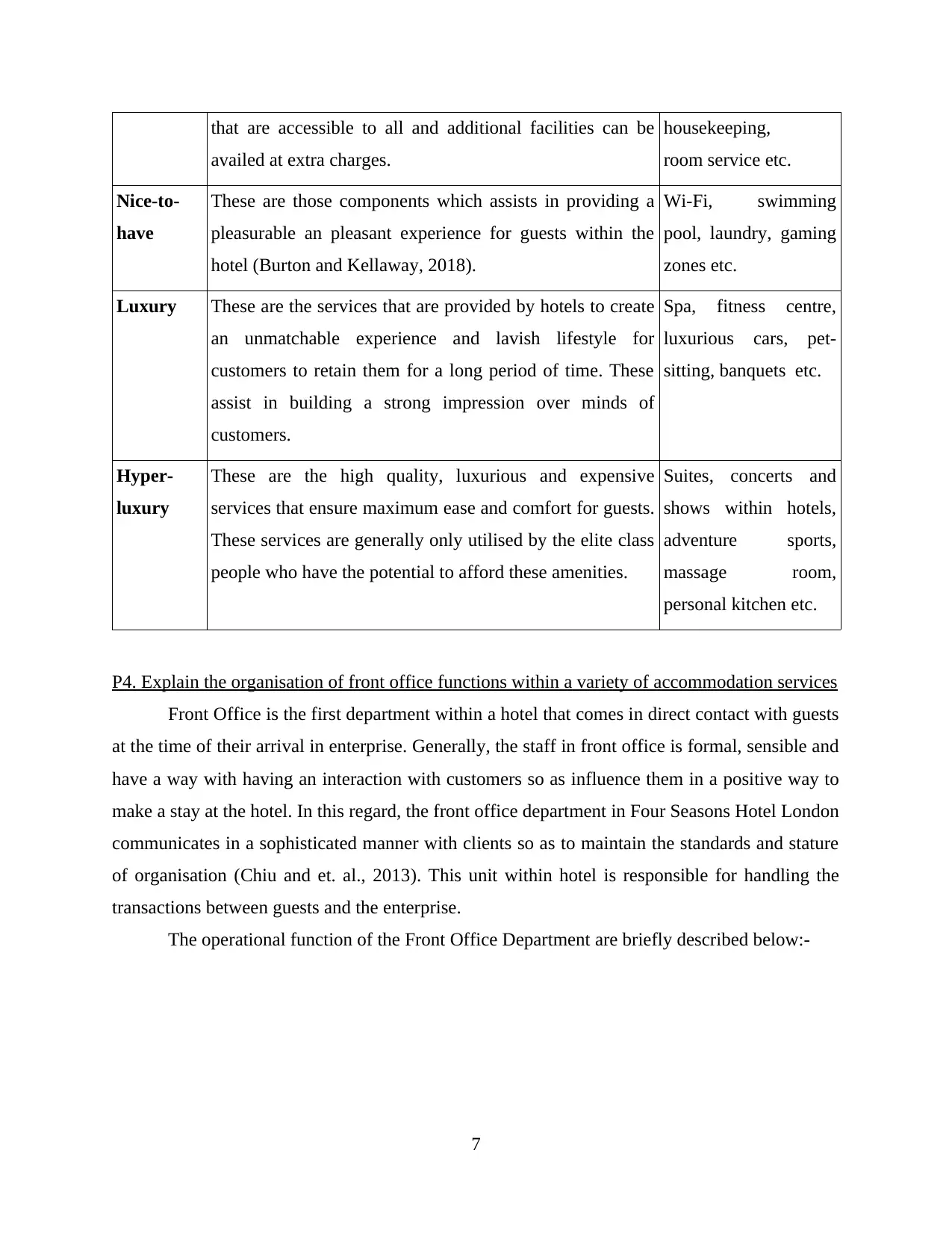
that are accessible to all and additional facilities can be
availed at extra charges.
housekeeping,
room service etc.
Nice-to-
have
These are those components which assists in providing a
pleasurable an pleasant experience for guests within the
hotel (Burton and Kellaway, 2018).
Wi-Fi, swimming
pool, laundry, gaming
zones etc.
Luxury These are the services that are provided by hotels to create
an unmatchable experience and lavish lifestyle for
customers to retain them for a long period of time. These
assist in building a strong impression over minds of
customers.
Spa, fitness centre,
luxurious cars, pet-
sitting, banquets etc.
Hyper-
luxury
These are the high quality, luxurious and expensive
services that ensure maximum ease and comfort for guests.
These services are generally only utilised by the elite class
people who have the potential to afford these amenities.
Suites, concerts and
shows within hotels,
adventure sports,
massage room,
personal kitchen etc.
P4. Explain the organisation of front office functions within a variety of accommodation services
Front Office is the first department within a hotel that comes in direct contact with guests
at the time of their arrival in enterprise. Generally, the staff in front office is formal, sensible and
have a way with having an interaction with customers so as influence them in a positive way to
make a stay at the hotel. In this regard, the front office department in Four Seasons Hotel London
communicates in a sophisticated manner with clients so as to maintain the standards and stature
of organisation (Chiu and et. al., 2013). This unit within hotel is responsible for handling the
transactions between guests and the enterprise.
The operational function of the Front Office Department are briefly described below:-
7
availed at extra charges.
housekeeping,
room service etc.
Nice-to-
have
These are those components which assists in providing a
pleasurable an pleasant experience for guests within the
hotel (Burton and Kellaway, 2018).
Wi-Fi, swimming
pool, laundry, gaming
zones etc.
Luxury These are the services that are provided by hotels to create
an unmatchable experience and lavish lifestyle for
customers to retain them for a long period of time. These
assist in building a strong impression over minds of
customers.
Spa, fitness centre,
luxurious cars, pet-
sitting, banquets etc.
Hyper-
luxury
These are the high quality, luxurious and expensive
services that ensure maximum ease and comfort for guests.
These services are generally only utilised by the elite class
people who have the potential to afford these amenities.
Suites, concerts and
shows within hotels,
adventure sports,
massage room,
personal kitchen etc.
P4. Explain the organisation of front office functions within a variety of accommodation services
Front Office is the first department within a hotel that comes in direct contact with guests
at the time of their arrival in enterprise. Generally, the staff in front office is formal, sensible and
have a way with having an interaction with customers so as influence them in a positive way to
make a stay at the hotel. In this regard, the front office department in Four Seasons Hotel London
communicates in a sophisticated manner with clients so as to maintain the standards and stature
of organisation (Chiu and et. al., 2013). This unit within hotel is responsible for handling the
transactions between guests and the enterprise.
The operational function of the Front Office Department are briefly described below:-
7
⊘ This is a preview!⊘
Do you want full access?
Subscribe today to unlock all pages.

Trusted by 1+ million students worldwide
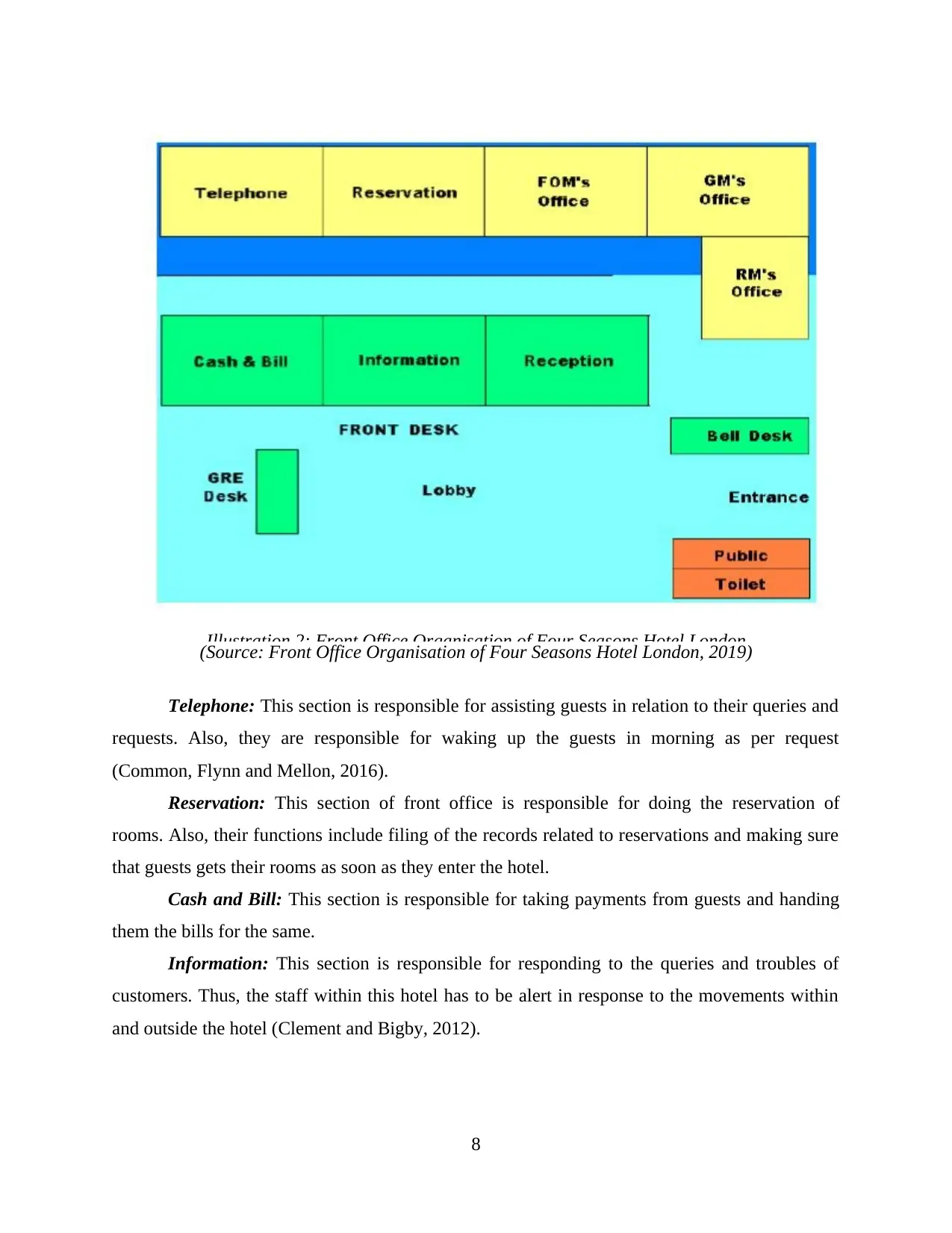
(Source: Front Office Organisation of Four Seasons Hotel London, 2019)
Telephone: This section is responsible for assisting guests in relation to their queries and
requests. Also, they are responsible for waking up the guests in morning as per request
(Common, Flynn and Mellon, 2016).
Reservation: This section of front office is responsible for doing the reservation of
rooms. Also, their functions include filing of the records related to reservations and making sure
that guests gets their rooms as soon as they enter the hotel.
Cash and Bill: This section is responsible for taking payments from guests and handing
them the bills for the same.
Information: This section is responsible for responding to the queries and troubles of
customers. Thus, the staff within this hotel has to be alert in response to the movements within
and outside the hotel (Clement and Bigby, 2012).
8
Illustration 2: Front Office Organisation of Four Seasons Hotel London
Telephone: This section is responsible for assisting guests in relation to their queries and
requests. Also, they are responsible for waking up the guests in morning as per request
(Common, Flynn and Mellon, 2016).
Reservation: This section of front office is responsible for doing the reservation of
rooms. Also, their functions include filing of the records related to reservations and making sure
that guests gets their rooms as soon as they enter the hotel.
Cash and Bill: This section is responsible for taking payments from guests and handing
them the bills for the same.
Information: This section is responsible for responding to the queries and troubles of
customers. Thus, the staff within this hotel has to be alert in response to the movements within
and outside the hotel (Clement and Bigby, 2012).
8
Illustration 2: Front Office Organisation of Four Seasons Hotel London
Paraphrase This Document
Need a fresh take? Get an instant paraphrase of this document with our AI Paraphraser
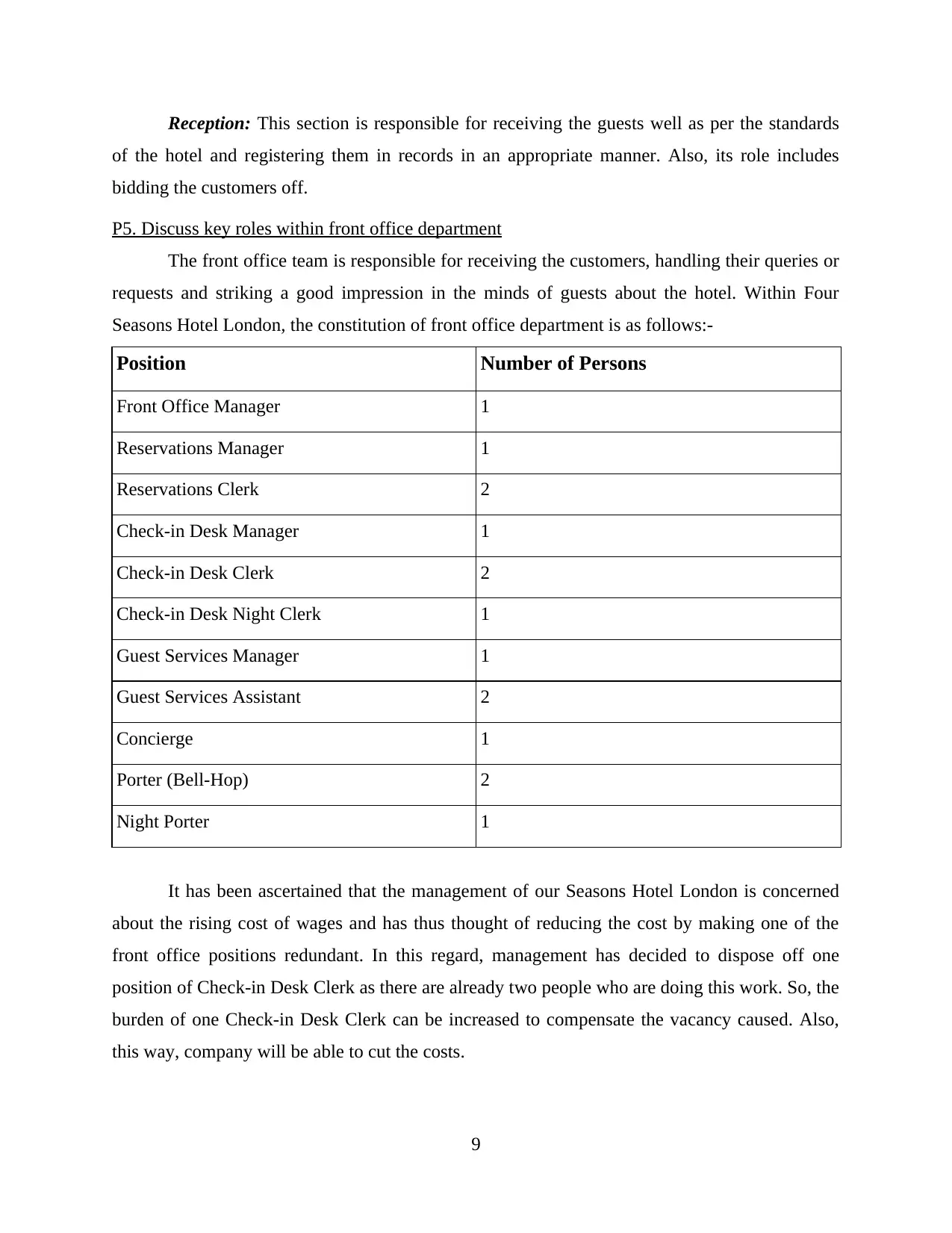
Reception: This section is responsible for receiving the guests well as per the standards
of the hotel and registering them in records in an appropriate manner. Also, its role includes
bidding the customers off.
P5. Discuss key roles within front office department
The front office team is responsible for receiving the customers, handling their queries or
requests and striking a good impression in the minds of guests about the hotel. Within Four
Seasons Hotel London, the constitution of front office department is as follows:-
Position Number of Persons
Front Office Manager 1
Reservations Manager 1
Reservations Clerk 2
Check-in Desk Manager 1
Check-in Desk Clerk 2
Check-in Desk Night Clerk 1
Guest Services Manager 1
Guest Services Assistant 2
Concierge 1
Porter (Bell-Hop) 2
Night Porter 1
It has been ascertained that the management of our Seasons Hotel London is concerned
about the rising cost of wages and has thus thought of reducing the cost by making one of the
front office positions redundant. In this regard, management has decided to dispose off one
position of Check-in Desk Clerk as there are already two people who are doing this work. So, the
burden of one Check-in Desk Clerk can be increased to compensate the vacancy caused. Also,
this way, company will be able to cut the costs.
9
of the hotel and registering them in records in an appropriate manner. Also, its role includes
bidding the customers off.
P5. Discuss key roles within front office department
The front office team is responsible for receiving the customers, handling their queries or
requests and striking a good impression in the minds of guests about the hotel. Within Four
Seasons Hotel London, the constitution of front office department is as follows:-
Position Number of Persons
Front Office Manager 1
Reservations Manager 1
Reservations Clerk 2
Check-in Desk Manager 1
Check-in Desk Clerk 2
Check-in Desk Night Clerk 1
Guest Services Manager 1
Guest Services Assistant 2
Concierge 1
Porter (Bell-Hop) 2
Night Porter 1
It has been ascertained that the management of our Seasons Hotel London is concerned
about the rising cost of wages and has thus thought of reducing the cost by making one of the
front office positions redundant. In this regard, management has decided to dispose off one
position of Check-in Desk Clerk as there are already two people who are doing this work. So, the
burden of one Check-in Desk Clerk can be increased to compensate the vacancy caused. Also,
this way, company will be able to cut the costs.
9
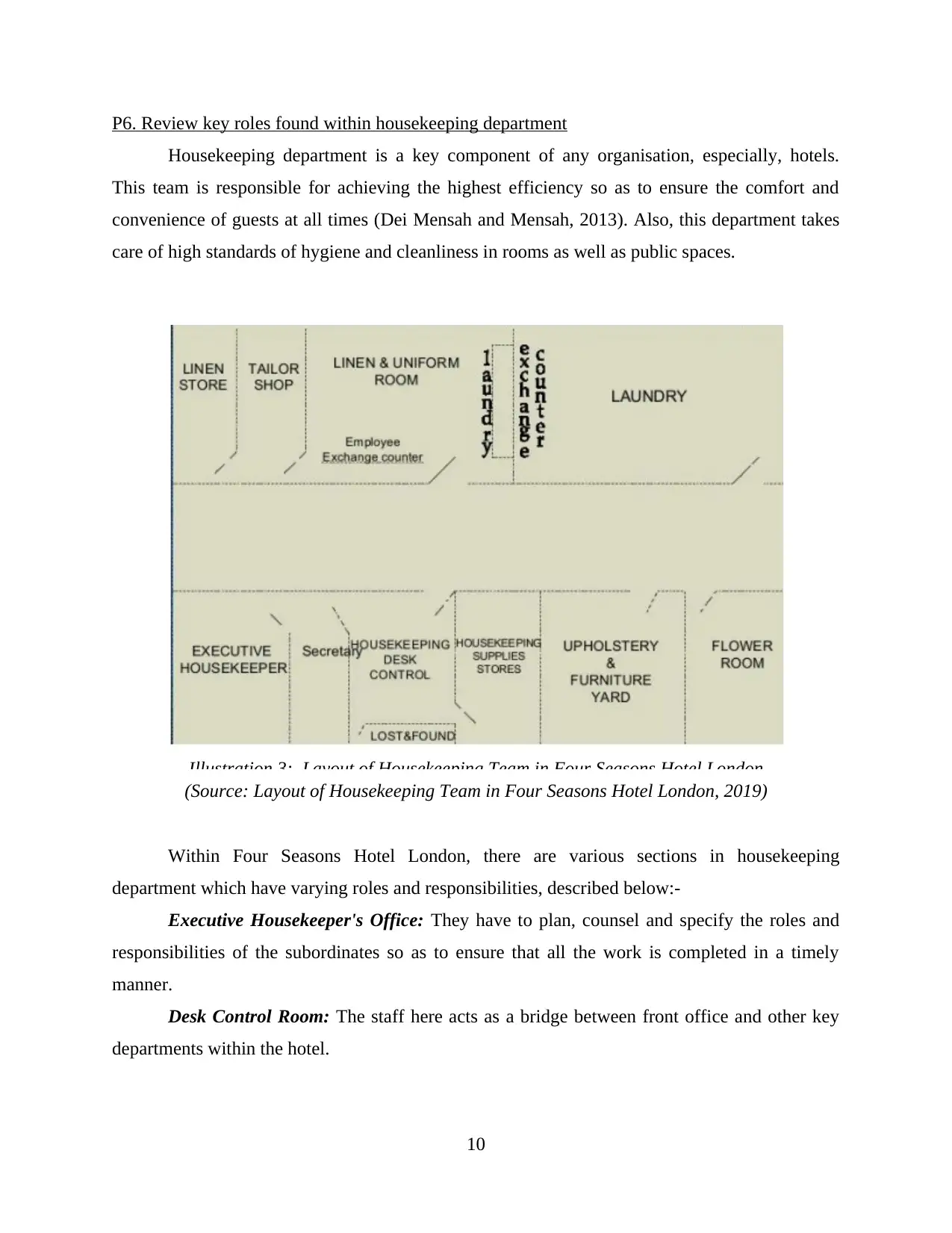
P6. Review key roles found within housekeeping department
Housekeeping department is a key component of any organisation, especially, hotels.
This team is responsible for achieving the highest efficiency so as to ensure the comfort and
convenience of guests at all times (Dei Mensah and Mensah, 2013). Also, this department takes
care of high standards of hygiene and cleanliness in rooms as well as public spaces.
(Source: Layout of Housekeeping Team in Four Seasons Hotel London, 2019)
Within Four Seasons Hotel London, there are various sections in housekeeping
department which have varying roles and responsibilities, described below:-
Executive Housekeeper's Office: They have to plan, counsel and specify the roles and
responsibilities of the subordinates so as to ensure that all the work is completed in a timely
manner.
Desk Control Room: The staff here acts as a bridge between front office and other key
departments within the hotel.
10
Illustration 3: Layout of Housekeeping Team in Four Seasons Hotel London
Housekeeping department is a key component of any organisation, especially, hotels.
This team is responsible for achieving the highest efficiency so as to ensure the comfort and
convenience of guests at all times (Dei Mensah and Mensah, 2013). Also, this department takes
care of high standards of hygiene and cleanliness in rooms as well as public spaces.
(Source: Layout of Housekeeping Team in Four Seasons Hotel London, 2019)
Within Four Seasons Hotel London, there are various sections in housekeeping
department which have varying roles and responsibilities, described below:-
Executive Housekeeper's Office: They have to plan, counsel and specify the roles and
responsibilities of the subordinates so as to ensure that all the work is completed in a timely
manner.
Desk Control Room: The staff here acts as a bridge between front office and other key
departments within the hotel.
10
Illustration 3: Layout of Housekeeping Team in Four Seasons Hotel London
⊘ This is a preview!⊘
Do you want full access?
Subscribe today to unlock all pages.

Trusted by 1+ million students worldwide
1 out of 16
Related Documents
Your All-in-One AI-Powered Toolkit for Academic Success.
+13062052269
info@desklib.com
Available 24*7 on WhatsApp / Email
![[object Object]](/_next/static/media/star-bottom.7253800d.svg)
Unlock your academic potential
Copyright © 2020–2025 A2Z Services. All Rights Reserved. Developed and managed by ZUCOL.





